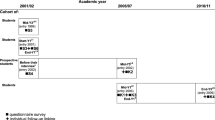Abstract
Few educational studies have investigated how well information learned by medical students is retained over time. The primary aim of this study was to investigate how much of the paediatric core curriculum undergraduates remembered a year after originally passing their paediatrics examination. In addition, we looked at whether students’ repeat performance is related to their approach to learning. Medical students were presented with 8 out of a possible 46 core curriculum short answer questions (Mark 1). A year later these same students were re-tested, without prior warning, on the same 8 questions (Mark 2) and a further 8 questions (Mark 3) from the bank of 46. The participants also completed the Revised two-factor Study Process Questionnaire to characterise their approach to learning. After a year, students scores had diminished by 51.2 % (95 % CI 48.2–54.2 %, p < 0.0001) from a Mark 1 average of 89.1 % (standard deviation, SD = 9.2 %) to a Mark 2 average of 37.9 % (SD 6.1 %). Students who reported a superficial approach to learning achieved higher scores for mark 1 (4.1 % increase (95 % CI 0.9–7.4 %) per one standard deviation unit increase in Surface Approach score (p = 0.01)). Neither deep nor surface approach to learning significantly predicted performance a year later (Marks 2 and 3). Students had forgotten more than half of the paediatric core curricular content that they had previously proven that they knew for their summative assessment. Adopting either a deep or superficial approach to learning did not predict ability to retain this information a year later.

Similar content being viewed by others
References
Biggs, J., Kember, D., & Leung, D. Y. (2001). The revised two-factor study process questionnaire: R-SPQ-2F. British Journal of Educational Psychology, 71, 133–149.
Burnett, P. C., & Dart, B. C. (2000). The study process questionnaire: A construct validation study. Assessment & Evaluation in Higher Education, 25, 93–99.
Conway, M. A., Cohen, G., & Stanhope, N. (1992). Very long-term memory for knowledge acquired at school and university. Applied Cognitive Psychology, 6, 467–482.
Cuthbert, P. F. (2005). The student learning process: Learning styles or learning approaches? Teaching in Higher Education, 10, 235–249.
D’Eon, M. F. (2006). Knowledge loss of medical students on first year basic science courses at the University of Saskatchewan. BMC Medical Education, 6, 5.
Kerfoot, B. P., Shaffer, K., McMahon, G. T., Baker, H., Kirdar, J., Kanter, S., et al. (2011). Online “spaced education progress-testing” of students to confront two upcoming challenges to medical schools. Academic Medicine, 86, 300–306.
Larsen, D. P., Butler, A. C., & Roediger, H. L. III (2008). Test-enhanced learning in medical education. Medical Education, 42, 959–966.
Larsen, D. P., Butler, A. C., & Roediger, H. L. III (2009). Repeated testing improves long-term retention relative to repeated study: a randomised controlled trial. Medical Education, 43, 1174–1181.
Ling, Y., Swanson, D. B., Holtzman, K., & Bucak, S. D. (2008). Retention of basic science information by senior medical students. Academic Medicine, 83, S82–S85.
Martenson, D. F. (1986). Students’ approaches to studying in four medical schools. Medical Education, 20, 532–534.
Marton, F., & Saljo, R. (1976). On qualitative differences in learning. I—Outcome and process. British Journal of Educational Psychology, 46, 4–11.
McLachlan, J. C. (2006). The relationship between assessment and learning. Medical Education, 40, 716–717.
McManus, I. C., Richards, P., Winder, B. C., & Sproston, K. A. (1998). Clinical experience, performance in final examinations, and learning style in medical students: Prospective study. BMJ, 316, 345–350.
Muijtjens, A. M., Hoogenboom, R. J., Verwijnen, G. M., & Van der Vleuten, C. P. (1998). Relative or absolute standards in assessing medical knowledge using progress tests. Advances in Health Sciences Education Theory and Practice, 3, 81–87.
Newble, D. I., & Entwistle, N. J. (1986). Learning styles and approaches: Implications for medical education. Medical Education, 20, 162–175.
Prosser, M., & Trigwell, K. (1999). Understanding learning and teaching: The experience in higher education. Buckingham: Open University Press.
Reid, W. A., Duvall, E., & Evans, P. (2005). Can we influence medical students’ approaches to learning? Medical Teacher, 27, 401–407.
Sisson, J. C., Swartz, R. D., & Wolf, F. M. (1992). Learning, retention and recall of clinical information. Medical Education, 26, 454–461.
Sullivan, P. B. (2008). An investigation into aspects of the Oxford undergraduate medical course in Paediatrics (pp. 11–32). Oxford: University of Oxford.
Swanson, D. B., Case, S. M., Luecht, R. M., & Dillon, G. F. (1996). Retention of basic science information by fourth-year medical students. Academic Medicine, 71, S80–S82.
Weitman, M. (1964). A study of long term retention in medical students. The Journal of Experimental Education, 33, 87–91.
Acknowledgments
We are grateful to Hilary Watt CStat CSci MSc MA from the Centre for Statistics in Medicine, University of Oxford for undertaking the statistical analysis.
Conflict of interest
The authors report no declarations of interest.
Author information
Authors and Affiliations
Corresponding author
Rights and permissions
About this article
Cite this article
Sullivan, P.B., Gregg, N., Adams, E. et al. How much of the paediatric core curriculum do medical students remember?. Adv in Health Sci Educ 18, 365–373 (2013). https://doi.org/10.1007/s10459-012-9375-y
Received:
Accepted:
Published:
Issue Date:
DOI: https://doi.org/10.1007/s10459-012-9375-y



